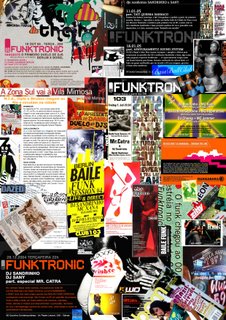"biggest cultural treasure we have right now"
Like I said, this has been a big week. While I can't underestimate the value of something as simple as having a contact in one of the favelas, as I do now with Rogerio and Dois Irmãos, the whole project was jumpstarted a few days ago when Maga Bo sent me what amounts to a rolodex of contacts in Rio. At this point, it's implied that any interview I conduct or person I meet or party I attend probably has something to do with that guy. (Although Reasoner deserves some points too.)
The first lead that has gone somewhere concrete was with Adriana Pittigiliani. She's an artist (esp. photography) and a booster of all things funk. As far as I can tell, she acts as something like a manager, or at the very least networks like one, and seems to have her fingers in all the major international promotions of funk (Diplo, Man Recordings) and is well-acquainted with the better-knowns locally (Mr Catra, DJ Sandrinho, DJ Sany Pitbull).

We had quite a long bate-papo ("chat" . . . has a distinctive enough word because Brazilians are known to chat and chat and chat . . . it took awhile to get out of there) about funk, favelas, and the Rio-US/Europe connection.
There's plenty of subtleties to be worked out in the ideas we discussed (Prof Sneed's thesis, which I've started, does a good job of that -- working on getting a link or permission to post the whole thing, & will certainly comment on it later), but a quick overview of the highlights:
- Invisibility: The favelas are invisible to the society at large, natch (ever since Wayne used it in reference to my blog, I've been tempted to pick it up), despite being up close & next to them instead of banished to the periphery. What's the best way to make yourself known to your rich neighbors? Guns work. So does earth-shattering bass. (but the two go hand in hand, the thesis isn't called Machine Gun Voices for nothing.) It's giving me a sudden urge to read Invisible Man. Certainly it's a universal theme.
- Ownership: Diplo was quoted in the April 2006 issue of BPM Magazine (afraid a link to the actual article is no where to be found, Adriana gave me a PDF of it) as saying:
It's tricky because a lot of artists from the morros in Rio, they don't really think past next week. They do their shows, drop a funk track here and there, bust into a funk ball and get some respect and some girls and some paper, and thank the Lord they can live another month. They don't have contracts, endorsements and marketing plans like rappers got in the US -- they just got a little love from their neighborhoods -- and they feel dignified and that's fulfilling. So it's not going to be the street shit to blow up in the US. The artists just can't mesh with the music lifestyle and business like we see in the US.
She agree wholeheartedly with this, and railed against the fact that DJ Marlboro holds 100% rights to almost 4,000 funk tracks cut by local MCs for whom the short-term promise of several months rent is far more important than abstract notions like copyright. He then gets his name on the credits (his production, his DJ in the studio), plays them on his radio show (and apparently they're watered down versions anyway, more radio-friendly), and reaps any potential royalties. Want to make a funk compilation? Fat chance, Adriana tells me, as the Nossa Design guys figured out, since he's sitting on all of the best recordings.
It does make me wonder, though, how the Man Recordings comps got out and who's profiting from them. I'm all for freedom of exchange (the production & distribution of the music within Rio seems to be nothing if not fluid), and these facts do put in a better light the criticism of Diplo's funk mixes for not crediting the artists (better but not perfect -- whether or not it's a money thing, and whether or not the original "artist" by our standards can be found, he had to know a thing or two about them, but then again he's into the closely-guarded-secret thing, or so I'm told). However, if someone is going to profit from this stuff monetarily, it should somehow trickle down into the communities that created it in the first place.
- Pastiche/Bricolage: That was ownership from the economic side, now let's get high-minded for a sec. Adriana is way into Roland Barthes -- I happen to think he's a pretty cool guy myself -- and together we vibed for a bit on the aesthetic of funk as a musical pastiche or bricolage (although the latter is of Lévi-Strauss coinage). I would say more of the latter than the former, however. Pastiche implies more parody or imitation, and a point that Adriana was insistent on is that you can't call funk simply some derivation of American hip-hop. Its Afro-Brazilian/Brazilian-Brazilian/is there much of a difference? roots & inspirations (capoeira, candomblé, samba, football) are not to be ignored. To that end, it's more a bricolage of musical styles, both local/national Brazilian ones and the imports of Euro-American cultural hegemony (cf the samples that made funk so popular up North in the first place: The Smiths, Tetris, The Clash, The Eurythmics, etc. etc.). That in turn makes it a distinctly postmodern musical form (this all relates to "Machine Gun Voices" -- I've already e-mailed to see if I can get permission to post it). But perhaps that bricolage is turning back over to pastiche? Part of the naive pleasure was that the older samples, as far as anyone could ascertain (or so Jace told me), probably came from black market bootleg tapes. As such, the DJs mashing them into funk tracks had no idea what kind of iconic status Morrisey carried to legions of kids who wanted to go out tonight but didn't have a stitch to wear. Now, as Adriana showed me, with Internet access readily enough available, a funk version of Madonna's "Hung Up" is being made in Rio, rather than by some bedroom DJ with a copy of FL studio and too much time on his hands. [desperate for mp3s, I know, she's giving me some next week.]
One quick mp3 before I take a baile nap (would be a disco nap, but tonight I'm not going to a disco . . .) and prepare for my first foray into funk in the flesh. Here's a track by Mr. Catra, who's gravelly voice I figured made him the Mark E. Smith of funk. Adriana, however, says it's just that he shoots it to hell by performing at 3, 4, or even 5 shows a night. (and I thought I had misunderstood the Portuguese when his manager wrote me back and offered to have me accompany him to a night of shows.) Frenetic, that's just how they do it down here.
Mr Catra - "Mamada Safada"



